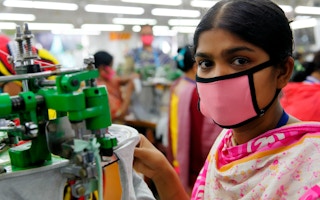A social sustainability consultancy which specialises in human rights has launched in Singapore.
Called Fair Future SG, the company is founded by international lawyer Natasha Latiff, previously technical advisor to the Afghanistan government on women’s affairs.
Fair Future SG launches to help companies in Asia Pacific remedy human rights violations in their supply chains, and provides social auditing, training, grievance remediation and policy advisory.
While regulatory and consumer pressure is growing on companies to respond to human rights risks, firms often approach social sustainability reporting as a “box-ticking exercise” and their systems lack enforcement mechanisms to prevent and remedy abuse, Latiff noted.

Natasha Latiff says that companies worry that if they do their due diligence properly they will become legally exposed, which is why they tend to be defensive and reactive to human rights issues. Image: LinkedIn
“Companies worry that if they do their due diligence properly they will uncover things that expose them legally, which is why companies tend to be defensive and reactive [to human rights issues],” she said, adding that human rights expertise is “very low” in Asia’s corporate sector.
Asia has the highest number of people working in forced labour, with some 9.5 million forced labourers in the region, according to the World Labour Organisation. Latiff noted that companies tend to do the bare minimum to address human rights issues and struggle to identify weaknesses in their supply chains.
Highlighting the collapse of the Rana Plaza textiles factory in Bangladesh in 2017, Latiff said that a social audit had been done a few months prior to the calamity that did not expose human rights vulnerabilities, and children were found in the rubble.
“My job is to encourage companies to go beyond compliance and take an approach centred on human development,” she told Eco-Business.
One way of doing so is to involve workers in the design of corporate human rights strategies, to understand their needs and identify where vulnerabilities exist, she said.
Companies should approach human rights not from a position of fear but of “curiosity”, explore where their social impacts are, and establish a dialogue with affected communities to ensure that violations are not repeated, she said.
Grievance mechanisms should be in place that are designed to protect the identities of whistleblowers who might fear losing their jobs if they complain, Latiff added.
She cited a study by KPMG that found that two-thirds of investors would pay a premium for companies that align with environmental, social and governance due diligence standards.
“It’s important for companies to recognise that there are benefits to be gained from stronger human rights policies. They don’t have to be afraid, they need to feel supported. That way they are likely to move ahead with progressive practices instead of getting defensive,” she said.
Latiff has 20 years experience in human rights advocacy. She also runs the United States-based non-profit Strategic Advocacy for Human Rights, which resources women civil society leaders in the Global South with the skills to push for change around gender-based violence.
Her consultancy launches the month after a study by International Labour Organisation found that US$236 billion of corporate profits were generated from forced labour in 2021.





















